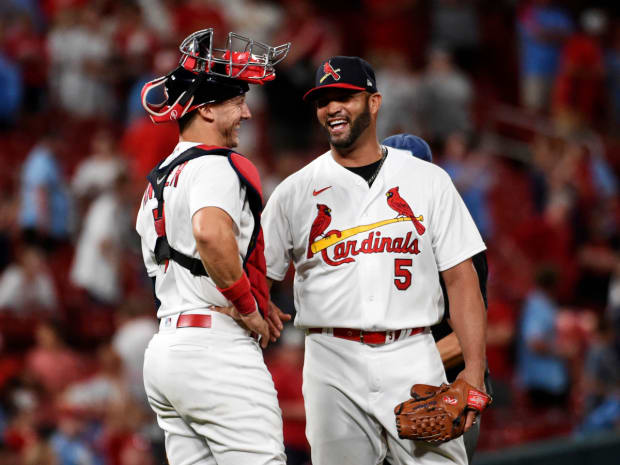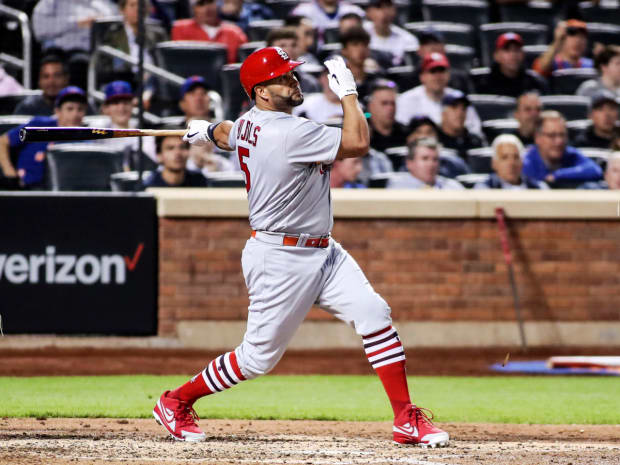The 42-year-old Cardinals legend is reminding us each day that some nostalgia trips can be productive and fun, too.

AP Photo/Joe Puetz
Welcome to The Opener, where every weekday morning during the regular season you’ll get a fresh, topical story to start your day from one of SI.com’s MLB writers.
There is something vaguely rude about the idea of giving a sprint speed for Albert Pujols.
First, there’s the bleak fact of the actual number: It feels like an affront to the individual definitions of both “sprint” and “speed” and certainly to their combined notion of “sprint speed.” (Entering Thursday, Pujols’s average was 22.9 feet per second, putting him in the slowest 1% of MLB and dead last among all players who are not catchers.) But the number itself does not matter too much in the end. No, it’s that the number can even be captured and shared to begin with: That Pujols is slow is as incontrovertible a truth as there can be in baseball. It’s so evident as to feel almost dull. To quantify it, to announce it, does not feel cruel so much as it feels simply impolite: Yes, thanks for your contribution, got any other incontestable facts to share? It’s gauche. Worse, it’s not interesting. Truly—who could be motivated to care? He’s 42-year-old Albert Pujols, back in uniform for the Cardinals! To be invested in any evaluation of his speed is to have completely lost the plot.
All of which is to say: Pujols knows that he is slow. Anyone on the field with him at any given time knows that he is slow. Pujols knows that anyone on the field with him at any given time knows he is slow. (The same holds for anyone in the stands and most probably anyone in the general vicinity at all.) There are no secrets here. There are only dull, clear, impolite truths. Which means that Pujols—for all his considerable gifts!—has neither of the core factors required for base-stealing. Those would be speed or surprise, and really, it’s preferable to have both. But a player generally needs at least one. And in the case of Pujols, one can successfully argue that no one in baseball has less of either.
You can see where this is going. In the top of the fourth inning Wednesday, with two outs, Pujols singled off Mets ace Max Scherzer. The game was tied. With Yadier Molina at the plate, two balls and one strike, Pujols took a decent lead. And then he was gone:
It was beautiful. There was nothing cheap about it; Pujols simply paid attention, waited for his moment, seized it as fast (or slow) as he could. It felt like the start of a good joke. Yet there was no way for it to be any funnier than if just stated plainly: 42-year-old Albert Pujols stole a base against the Mets. No one could possibly have asked for more.
This was Pujols’s first steal of the year, which means that despite his famous lack of speed, he has now stolen at least one base in 21 of his 22 seasons in MLB. (The lone exception was the shortened pandemic campaign two years ago.) It highlights something not to be taken for granted: The veteran is very, very good at picking his spots. Pujols is 14–1 in stolen base attempts over the last seven seasons. Which, sure, that might not sound like much. But consider how easy it could have been for him to decide never to look for a steal again. After all, if ever there was a category of player to get a pass in this department, “600-Home-Run-Club member in his 40s” would be it. Yet Pujols has never given up completely on trying to steal. That’s not to say that he tries particularly often or makes trying look particularly good. But he knows when to try. He knows that he is slow—knows that he surprises no one with how slow he is—and still he knows just when to try.

Wendell Cruz/USA TODAY Sports
That general concept has applied to the rest of his game lately, too. It is still early enough in the year for statistics to come with the prim, scolding tag of small sample size, a reminder not to get too excited. Still: Pujols’s .803 OPS entering Thursday qualifies for his best start to a season since 2014. He’s lifting the ball more than he has in years. He’s walking the most that he has since ’10. If the last few years have felt primarily like a reminder of how old he is—he has not finished a season as an above-average hitter since 2017—this one has felt like a reminder of how young he might still be. His return to St. Louis has been in many ways a nostalgia trip. But Pujols has played as if to deliver a reminder each day: Nostalgia can be productive, too.
Watch MLB games online all season long with fuboTV: Start with a 7-day free trial!
On Sunday night, Pujols made his pitching debut in the ninth inning of a blowout win over the Giants. He gave up four runs and looked jubilant throughout. The whole thing was oddly sweet: Here was a player who spent decades looking superhuman, and now, in the twilight of his career, he’d finally allowed himself to look like a kid. It was far sillier and more precious than something as mundane as a stolen base. Yet the two moments feel somehow linked. This is Pujols—who sits atop a slew of active statistical leaderboards, who has done just about everything, who has been here for so long—playing baseball simply because he can. This is Pujols, getting to first base, taking a lead, waiting and watching and waiting and watching until he has a moment where he can run, and it won’t matter how slow.
More MLB Coverage:
• Making the Case for the American Baseball Cup
• How Concerned Should We Be About These Five Star Shortstops?
• The Yankees Are the Class of MLB This Season
• Inside the Reds’ Historically Bad Start to the Season
• Hitter, Pitcher, Prankster: Shohei Ohtani Is a Triple Threat
Sports Illustrated may receive compensation for some links to products and services on this website.